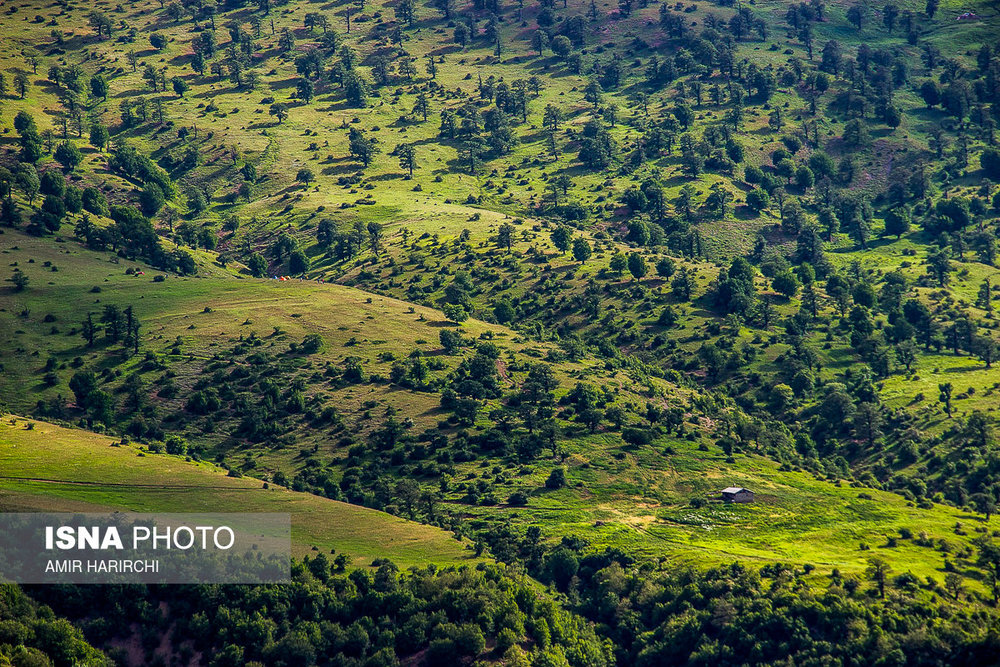Silent death: Zagros Mountains forest plagued by deforestation, degradation

TEHRAN — Deforestation and degradation are gravely threating the Zagros Mountains forest and the current trend can seriously harm the ecology of the region and its biodiversity in the near future.
Zagros Mountains forest steppe ecoregion with an area of about 6 million hectares (3.5 percent of Iran) is located primarily in Iran, ranging northwest to southeast and roughly paralleling the country's western border. The forests constitute 40 percent of the country’s forested area and is stretching over 12 provinces. These forests have also been called western oak forests, due to the dominancy of oak species.
According to the Science Direct Western oak forests are home to many species including, the Persian squirrel which is the indicator species of this region. Persian squirrels and oak trees have symbiotic relationships, in which forests provide ecological requirements of Persian squirrels such as food and shelter and, in return, the Persian squirrel contributes in seed germination and forests’ regeneration.
A wide variety of wildlife, including wolves, leopards, and even the Persian fallow deer which was once thought extinct have made their homes in the mountains.
Deforestation and poaching are the major threats to wildlife in the region. The lack of accurate knowledge about these forest habitats also hinders the effective planning and management of these forests and the wildlife within them. Preparing update maps and awareness of past to present changes would be useful for wildlife conservation planning.
Zagros Mountains forest’s importance lies with its capability to be a barrier against sand and dust storms to the central Iran and 40 percent of the country’s water reservoir exist in the region.
Over previous decades of drought spells, tree diseases and wildfires have threatened the forest, but now illegal logging is a bigger danger to the precious ecosystem.
Limitations on forest exploitation, stricter rules on timber importation to the country as well as increased custom tariffs on them, have given rise to illegal logging in protected areas of Zagros forests.
Illegal loggers cut trees and take them to charcoal furnaces.
Zagros mountain forests in West Azarbaijan, covering an area of 110,000 hectares, are being plagued by illegal logging for some time now.
On January 15 commander of the protection unit of natural resources and watershed management department of West Azarbaijan explained that in the current year (starting on March 21, 2018) more than 150 tons of smuggled log has been seized.
Over the past decade generally some 10 tons of smuggled log have been seized, but the number have grown 15-fold this year, IRNA news agency quoted Yousefali Embrahimpour as saying.
Despite all the efforts only 10 percent of the smuggled logs have been seized and the rest were imported out of province, he regretted.
The ban on exploitation of endangered forests has worsened the situation in western and southwestern forests and led to greater smuggling of logs, he added.
In January 2017 in line with the laws regulating all aspects of policy making and project managements with regard to environmental factors Majlis [Iranian parliament] has prohibited any exploitation of endangered forests by the fourth year of implementing the sixth five-year national development plan.
With 157 MPs voting for the bill, exploitation of forests for commercial and industrial purposes will be brought to a halt by 2020. By that time all exploitation contracts will be expired and none will be renewed.
All exploitation projects will be banned with the exception of broken branches, fallen or damaged trees which can be only authorized by the Forests, Range, and Watershed Management Organization.
The administration must also allocate budget to shift from logging to wood import in order to move toward sustainable development.
Ja’far Nouri, director of governmental discretionary punishments organization of Mahabad and Piranshahr, West Azarbaijan province, also told IRNA news agency that 17 tons of smuggled logs have been seized in the area and the violators got fined 68 million rials (nearly $1,600).
The fine is only for carrying the smuggled log and is levied by the governmental discretionary punishments organization and other environmental organizations would impose the fine for harming the forests, Nouri stated.
Normally smugglers transfer the logs from roads linking West Azarbaijan to central Iran.
Head of natural resources and watershed management department of Mahabad, Majid Patou, said that in the current year more than 100 tons of smuggled logs have been seized on Mahabad roads.
Even those who want to cut broken branches, fallen or damaged trees in their own gardens should obtain necessary permits from natural resources and watershed management department, Patou noted, adding that some of the smugglers try to hide tree logs cut from the forests beneath the fallen and broken trees gathered from around the riversides to flout the law, so that all log cargos must obtain legal permits.
Decreasing custom tariffs on imported wood, easing timber importation, and growing trees for logging are some of the measures that can help in the battle against illegal logging and deforestation in Zagros forests.
Short-term and long-term plans to address illegal log trade should be implemented before the ban on exploitation of endangered forests would go into effect fully by 2020, or the forests will be severely degraded within the next few years.
MQ/MG
Leave a Comment